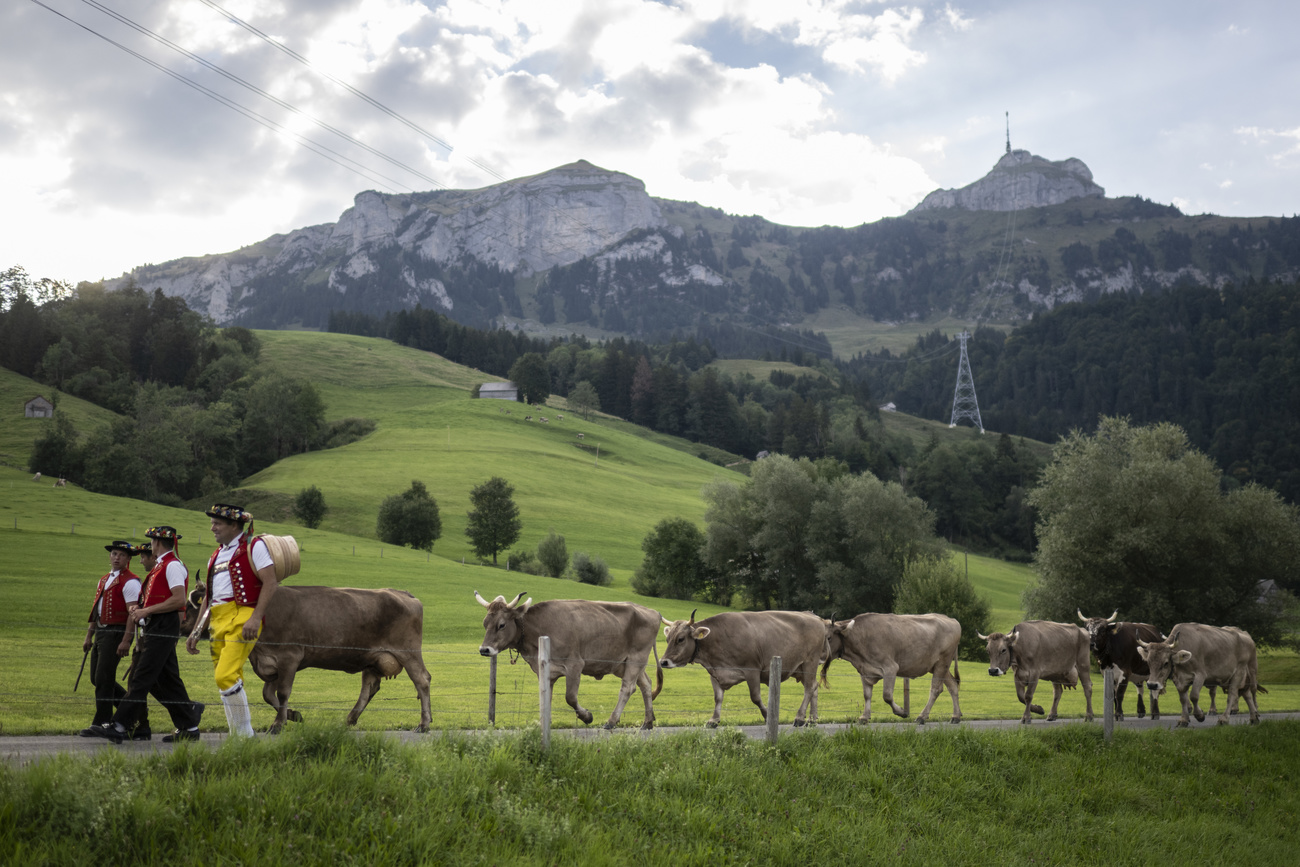
Alpine season named intangible cultural heritage of UNESCO

UNESCO, the United Nations Educational, Scientific and Cultural Organization, has inscribed the Swiss Alpine season and the multinational traditional irrigation practised in Switzerland on the representative list of the Intangible Cultural Heritage of Humanity.
The decision to include the two traditions on the list was taken by the Intergovernmental Committee for the Safeguarding of the Intangible Cultural Heritage at its 18th session in the African state of Botswana on Tuesday.
As an exemplary tradition of the Swiss mountain regions, the Alpine season combines skills, customs and rituals related to Alpine farming, the Federal Office of Culture announced on Tuesday.
Driving cattle up to high pastures for the summer is a living tradition that has been documented since the Middle Ages at the latest. Since then, the Alpine season has been continuously adapted to local climatic, social and economic conditions, the office also reported. High-quality food, for which Switzerland is renowned, has also been and continues to be produced during the Alpine season.
+ Why Swiss cows climb mountains
The Alpine season brings together a whole repertoire of customs, skills and rituals that make it an extremely lively cultural heritage, the report continued. These include, for example, the ascent and descent of the Alps, knowledge of pasture farming and cheese-making, the craft techniques used to make equipment and the rich traditional songs.
The application dossier submitted in March 2022 was compiled by the Federal Office of Culture and experts from the fields of cultural heritage and agriculture. According to the Federal Office of Culture, they were supported by an extended advisory group consisting of representatives from the Alpine economy, the cantons, museums, nature parks and other relevant organisations.
Thanks to this broad-based approach, the diversity and richness of Alpine traditions could be depicted and important topics relating to the next generation and adaptation to climate change could be highlighted. In order to meet the current challenges for the passing on of tradition, joint measures were developed in the areas of cross-sectoral cooperation, training, recruitment, raising public awareness, communicating cultural heritage and interdisciplinary research, the report continued.
+ Alpinism gains UNESCO heritage status
Multinational tradition
Meanwhile, the dossier “Traditional Irrigation: Knowledge, Technology and Organisation”, which was also presented in March 2022, was coordinated by Austria and developed with the participation of Belgium, Germany, Italy, Luxembourg, the Netherlands and Switzerland.
The candidature aims to valorise traditional models of irrigation and water management, in particular management in so-called “Geteilschaften”, historical cooperatives that manage common property locally and in a participatory manner.
In Switzerland, the water meadows of the Oberaargau in cantons Bern and Lucerne as well as the Bisse communities in Valais (Oberwalliser Sonnenberge, communities of Ayent, Lens, Trient, Nendaz and Grächen) are included in this candidature, according to the Federal Office of Culture.
Preserving living traditions
With the Convention for the Safeguarding of the Intangible Cultural Heritage, UNESCO aims to address and protect a cultural heritage that is linked less to buildings or spaces than to time, community practices and social interactions.
This heritage includes living traditions such as oral expressions, performing arts, social practices, rituals and festivals, knowledge and practices in dealing with nature and the universe, as well as traditional craftsmanship.
This news story has been written and carefully fact-checked by an external editorial team. At SWI swissinfo.ch we select the most relevant news for an international audience and use automatic translation tools such as DeepL to translate it into English. Providing you with automatically translated news gives us the time to write more in-depth articles. You can find them here.
If you want to know more about how we work, have a look here, and if you have feedback on this news story please write to english@swissinfo.ch.

In compliance with the JTI standards
More: SWI swissinfo.ch certified by the Journalism Trust Initiative


























You can find an overview of ongoing debates with our journalists here . Please join us!
If you want to start a conversation about a topic raised in this article or want to report factual errors, email us at english@swissinfo.ch.